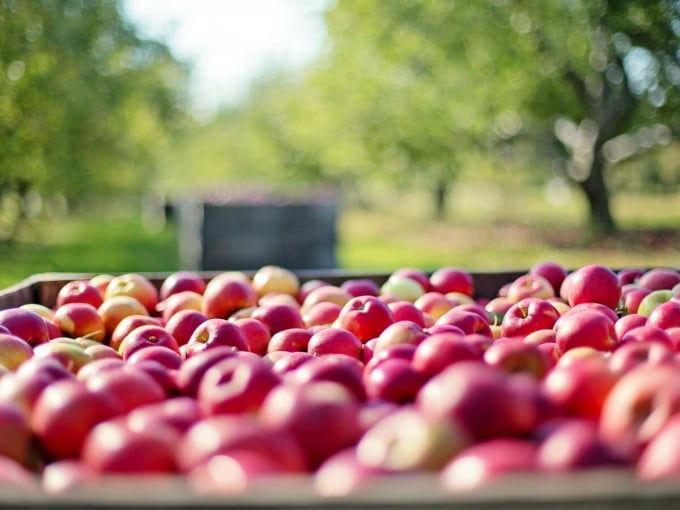November 25, 2025 | 17:11 GMT +7
November 25, 2025 | 17:11 GMT +7
Hotline: 0913.378.918
November 25, 2025 | 17:11 GMT +7
Hotline: 0913.378.918

Picked apples on orchard. Photo: Jill Wellington from Pixabay
In a study published in Green Chemistry , the researchers trialed the use of greener solvents to collect compounds found in apple pomace known for their powerful antioxidant, antibacterial, anti-diabetes and anti-inflammatory properties.
Co-author of the study, researcher Dr. Long Yu from the University of Adelaide's School of Agriculture, Food and Wine said: "Apple-processing industries generate tons of waste and by-products every year.
"Currently only around 20 percent of apple waste is retrieved and used as animal feed. The rest is incinerated, or sent to landfill or composting, which releases significant amounts of greenhouse gases."
Apple pomace (consisting of peels, pulp and seeds) is known to be rich in molecules known as 'flavonoids," which help regulate cellular activity and fight off free radicals.
"Extracting the 'goodness' from apple pomace is one way to make better use of this waste product and could help the apple processing industry become more sustainable," Dr. Yu said.
However, because the health-promoting extracts found in apples have low solubility in water-based solutions, up until now they have been difficult to collect without using toxic organic solvents, which generate large amounts of pollutants.
To address this problem, in their study the researchers investigated extraction using a new generation of green solvents known as Deep Eutectic Solvents (DES). These solvents consist of natural molecules, and provide a greener alternative to volatile and toxic organic solvents due to their superior extractability, negligible volatility and non-flammability. The solvents are also inexpensive.
The researchers developed an optimized approach using the green solvent to simultaneously collect and modify the health-promoting molecules pulled from apple pomace.
Compared with traditional solvents, the amount of bioactive compound pulled from apple pomace using the DES solvent was significantly higher than that collected using traditional solvents. Professor Vincent Bulone from the University of Adelaide's School of Agriculture, Food and Wine who supervised the research and co-wrote the paper, says they also found the antioxidant activity in the extracts was significantly higher than in samples obtained by conventional solvent extractions.
"We can conclude that DES is a green and tuneable alternative that not only efficiently collects powerful healthy molecules found in apple pomace, but also boosts the antioxidant activity of the extract. Not only do DES provide a more environmentally friendly way to make better use of what would otherwise go to waste, but the collection method may provide a way to improve skincare, biopharmaceuticals and nutraceuticals," said Professor Bulone.
The researchers say the same principle and approach could also be used to collect and modify other health-promoting molecules from other agricultural and food waste.
(Phys.org)

(VAN) Brazil's COP30 presidency pushed through a compromise climate deal on Saturday that would boost finance for poor nations coping with global warming but that omitted any mention of the fossil fuels driving it.

(VAN) Poultry farmers in the UK have been warned that they could face one of the worst winters yet for bird flu.

(VAN) Prices of main-crop paddy have risen sharply, with jasmine rice hitting 16,100 baht per tonne — the highest level in years.

(VAN) In Brazil, FAO unveiled a series of reports and initiatives showing how sustainable agrifood systems are a solution to the climate crisis.

(VAN) With names like neodymium and dysprosium, rare-earth elements sound exotic — and their perceived scarcity has only added to the mystique.

(VAN) In a new study published in Trends in Biotechnology, researchers used a gene-editing technology called CRISPR to increase a fungus's production efficiency and cut its production-related environmental impact by as much as 61%- all without adding any foreign DNA.

(VAN) A top official in Beijing’s Cop delegation says China is committed to clean energy – but US’s absence is a problem.